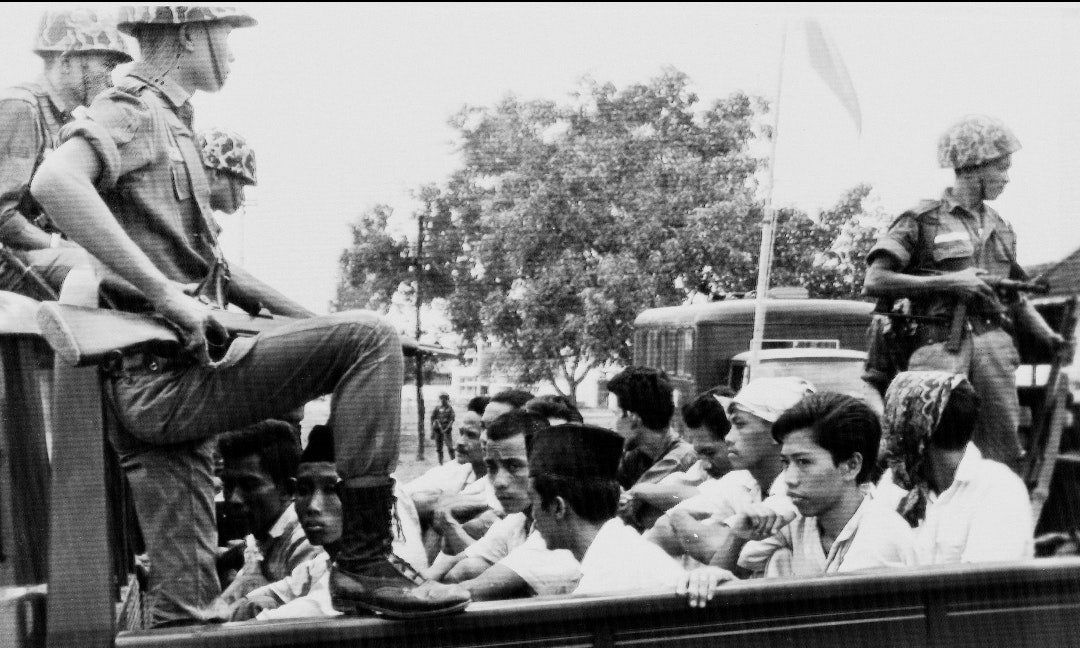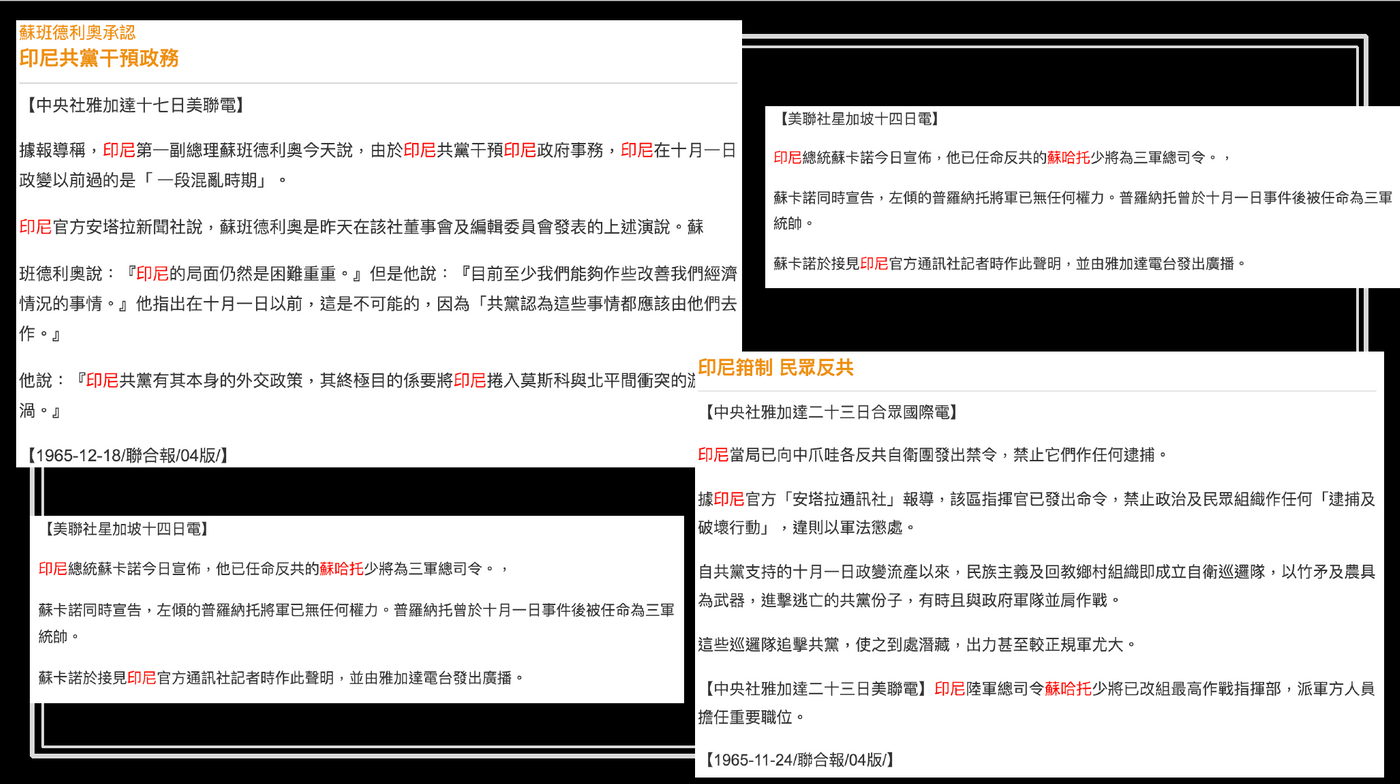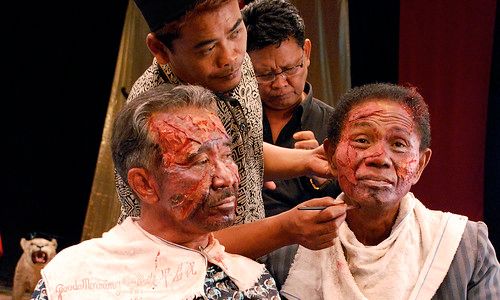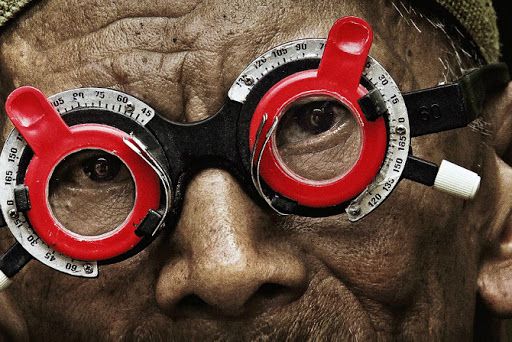Anti-Communist or Anti-Human Holocaust? Now look at the September 30th Incident in Indonesia

American director Joshua Oppenheimer filmed "The Act of Killing" and "The Look of Silence", focusing on the perpetrators and persecuted people of the "930 Incident" massacre in Indonesia theme. According to the director's interview, the two films are not to expose the past, but to reflect the injustice in Indonesian society today.
>Indonesia 1965 "930 Incident"
The 930 Incident was a military coup in 1965, when President Sukarno was overthrown by General Suharto, backed by Western forces, due to his leaning towards the communist camp, and instigated a nationwide anti-communist massacre. Due to the majority of Chinese in the Indonesian Communist Party, many Chinese who are not members of the Communist Party have also been misidentified or implicated as spies. The military also launched raids on Communist villages on a scale that could be called "village extermination." The death toll is estimated to be between 100,000 and 3 million, but the academic consensus is around 500,000.
Since then, Indonesia's original left-leaning foreign policy has turned to be pro-US, and the Indonesian military has also received US support. This military coup has planted a seed in Indonesia's historical development. So far, there are still doubts about military intervention in the country. Due to Suharto's dictatorship for many years, Indonesia lacks democracy and freedom of speech. Corrupt officials have corrupted the country's political economy and have not been reasonably resolved, and are still suffering from his legacy.
In the massacre, the Chinese were deprived of their lives and property, and many Chinese were forced to leave their homes. The survivors did not dare to participate in politics later. Whenever Chinese festivals were held, they could only celebrate secretly. In recent years, the atmosphere of Chinese political participation has gradually changed, but the environment is still very difficult.
In 2016, the International People's Tribunal, a non-governmental organization, issued a verdict that the Indonesian government committed massacres and other crimes against humanity when it suppressed supporters of the Communist Party in 1965. Therefore, the Indonesian government should apologize to the victims and make compensation, while investigating and punishing those involved in this crime. massacre people. However, this judgment is not actually legally binding, and the Indonesian government refused to accept and enforce it the day after it was issued. The court also held that the United States, Britain and Australia were accomplices of the Indonesian government at the time, and provided military and public opinion support to Indonesia.

After World War II, the United States and the Soviet Union became the two giants in the world, representing the capitalist camp and the communist camp respectively. The United States adopted a policy of containment against the Soviet Union. At that time, President Truman proposed the Truman Doctrine to aid economically depressed Europe and avoid revolution. The move marked the beginning of the Cold War. Nationalist movements such as Indonesia are believed to be linked to communism, and the US and the Soviet Union continued to compete for influence in the process of decolonization of the Third World in the 1950s and early 1960s. Both countries provided arms to the groups they supported, and these countries also supported both the United States and the Soviet Union in the United Nations vote.
Although it was difficult to influence the perception of the Soviet camp, the United States continued to support friendly Third World regimes as a strategy to contain Soviet expansion, and to intervene in the political, economic, or military interior of countries they believed were at risk of a communist seizure of power. Internally, the United States carried out powerful media brainwashing and spread anti-communist ideas. Even if there is a humanitarian crisis in the world, as long as it is an anti-communist act, it will be portrayed as a heroic deed. Take Lianhe Daily as an example at the time. Lianhe Daily used the headline "Indonesian Communist Party Interferes in Government Affairs" and highlighted the behavior of "people's anti-Communist", setting the event as anti-Communist rather than massacre.

> "Murder" and "Silence"
In "Murder in One Action", the director guides the protagonist to recreate the 930 incident. At first, the protagonist and his friends brag about how they kill people without blinking, and finally realize how cruel they have done. The transition between them is not surprising. in one breath. And "Silent Moment" starts from the standpoint of the victim's family and has a dialogue with the persecution system at that time. You can see the perpetrators who still hold power in Indonesia to this day, as well as the victims' families who are silent and suffocated.
Although the directors of "Murder" and "A Moment of Silence" are white Americans, the directors try to let the subjects lead the direction of the film and avoid showing the perspective of white Americans viewing the third world. The choice of the subjects is quite interesting. Anwar Congo, the protagonist of "Murder", seems to be the only person who feels uneasy in his conscience; while the protagonist of "A Moment of Silence" broke the established impression of the victim's family and bravely questioned the persecuting system.
The protagonist of "Murder in One Action" is usually a street gangster, who may have been the perpetrators from top to bottom at the time of the incident. When he reenacted the murder situation, while asking the actors to act more cruelly, he doubted his own behavior, and in the face of the lies weaved to make himself feel at ease, a contradiction and inner conflict occurred. And Adi, the protagonist of "A Moment of Silence", is an optometrist by profession. The world seen through optometry lenses seems to be different from the world described by the perpetrator (family member). What is truth and what is justice?

Adi visited the persecution system at that time and their family members one by one, from killers to high-level officials, the parties did not admit their accounts at all, and rebuked Adi for the Communist Party that endangered the country, and some family members sincerely apologized to Adi on behalf of their families. What Adi wants is the truth and an apology, so simple but out of reach. Transformational justice is not a necessary process of opening wounds but debridement. Only through thorough disinfection can re-inflammation be avoided.
The Indonesian government is still under the control of the original military government, and the "930 Incident" is still a taboo topic in Indonesia. The school system teaches students the brutality of the Communist Party, covering up the fact of the massacre of the Communist Party. The director was later banned by the Indonesian government from entering the country. There is a sentence in "One Action to Kill", "Justice is defined by the winner." Therefore, the anti-communist ideology at that time made the perpetrators think that they were doing the right thing, and now the justice we believe in is of course an ideology. But the author believes that at least the truth must come to the surface, and the process may be painful, but this is a process we must face together, face history and avoid repeating it. With the declassification of the data, it was found that many countries had intervened in it. From this incident, we can clearly see the influence of politics on the media, as well as the interference of the first world on the third world. Anti-communism is not a reason for the massacre, and there is no reason to justify such an act against humanity.
Like my work? Don't forget to support and clap, let me know that you are with me on the road of creation. Keep this enthusiasm together!
